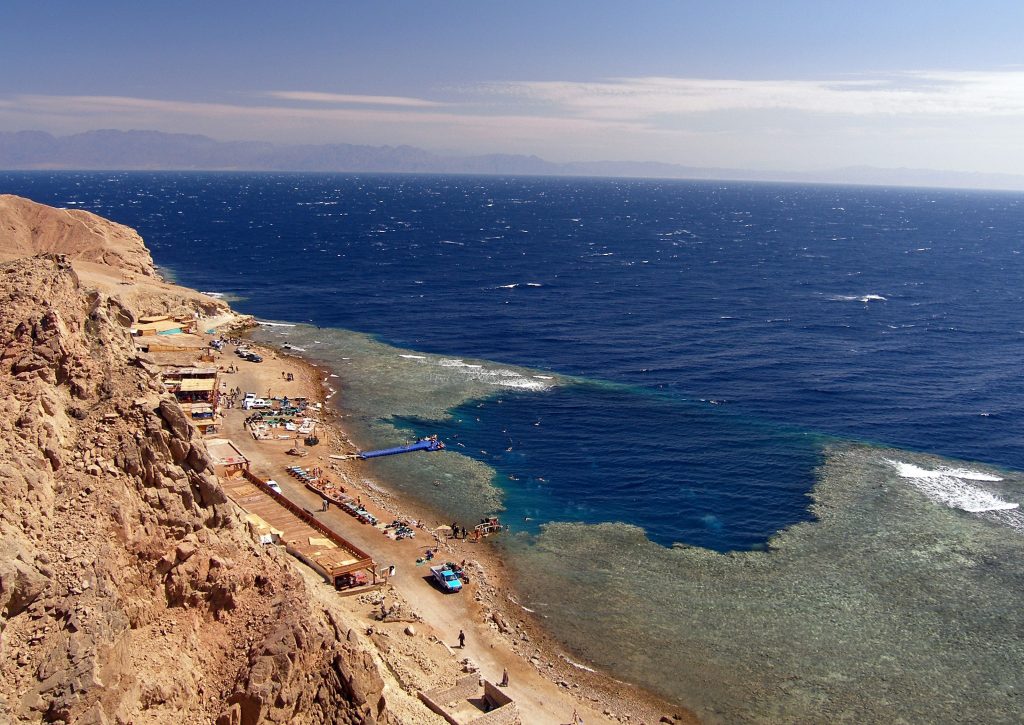
(5-6 Minute Read)
Exodus 13:17 – 17:16
When Pharaoh let the Israelites go, the Most High did not lead them out by the closer way of the Philistines to avoid war. Instead, he led them out by the wilderness of the Sea of Reeds (i.e. the Red Sea). Moses brought the bones of Joseph with them according to the previous oath he had exacted upon the descendants of Israel. The Almighty went before the Israelites, guiding them and giving them light as a pillar of cloud by day and a pillar of fire by night.
The Eternal One told Moses to encamp by the sea, and that Pharaoh would think that they were lost in the wilderness. Then He would stiffen Pharaoh’s heart and pursue them, and the Most High would be glorified through Pharaoh and the host of Egyptians.
Seeing that the people had fled, Pharaoh and his courtiers changed their minds about releasing the Israelites. Pharaoh took 600 select chariots, and the rest of the Egyptian chariots along with their officers and pursued the Israelites.
As Pharaoh and his chariots drew close to the Israelite encampment by the sea near Pi-hahiroth and Baal-zephon, the Hebrews saw them and were greatly frightened. They cried out to the Almighty and complained to Moses, saying that it would have been better to be enslaved to the Egyptians than to die in the wilderness. Moses replied that they should put aside their fear; the Most High would battle for them, and they would witness the deliverance of the Almighty.
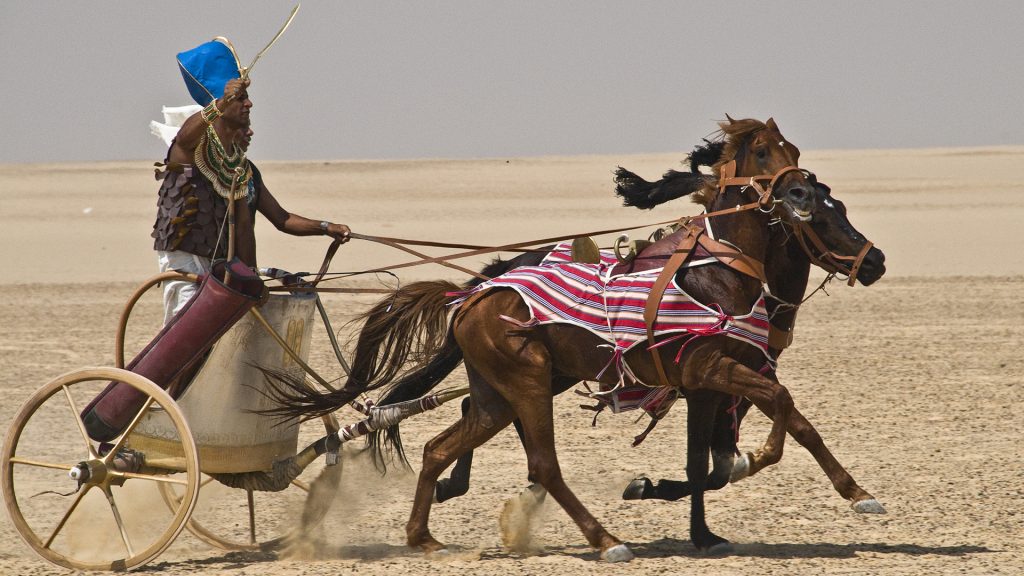
The Eternal One said to Moses, “Why do you cry out to me? Tell the Israelites to go forward.” He further told Moses to hold his rod over the sea and split it so the Israelites could cross on dry ground. The Egyptians would follow, and the Almighty would be thus glorified; the Egyptians would know that He is the Most High.
The angel of the Most High moved from the front to the rear along with the pillar of cloud, coming between the Egyptians and the Israelites. The cloud prevented the one from coming near the other all night.
Moses lifted his arm and the Almighty drove the sea back with a strong east wind all that night, splitting the waters and revealing dry ground. The Israelites entered on dry ground, and the sea waters formed a wall on their right and their left. The Egyptians pursued them.
The Most High looked down upon the Egyptians from the pillar of fire and cloud and threw them in a panic. He locked up (or broke off*) the wheels of the Egyptian chariots. They exclaimed that the Almighty was fighting for the Israelites against them, and that they should flee.
The Almighty instructed Moses to hold his arm out over the sea so that the waters would come back upon the Egyptians. Moses did so, and at daybreak the sea returned to its normal state. The Egyptians tried to flee, but they were all covered by the waters; not one of them remained alive. But the Israelites had marched through the sea, and thus the Most High delivered them. The Israelites saw the Egyptians dead on the shore; they revered the Almighty and had faith in Him and His servant, Moses.
Then Moses and the Israelites sang this song to the Almighty:
“I will sing to the Most High, for He has triumphed gloriously;
Horse and driver (or rider), Pharaoh’s chariots and army
He has hurled into the sea.
The Almighty is my strength and might;
The Most High, the Warrior.
Your right hand, O Most High, is glorious in power;
In Your great triumph You break Your opponents.
At the blast of Your nostrils the waters piled up,
The floods stood up straight like a wall.
The foe said,
‘I will pursue and divide the spoil.’
You made Your wind blow, the sea covered them;
They sank like lead in the majestic waters.
Who is like You, O Most High, among the ‘gods’?
Who is like You, majestic in holiness,
Awesome in splendor, working wonders!
The nations around hear and tremble;
Philistia, Edom, Moab, and Canaan.
You will bring your people to cross over,
And plant them in your mountain, Your dwelling place.
The Almighty shall reign forever and ever.”
Miriam the prophetess, Aaron’s sister, and all the women with her, danced with timbrels and sang:
“Sing to the Almighty, for He has triumphed gloriously;
Horse and driver He has hurled into the sea.”
Moses caused Israel to depart from the Sea of Reeds. They traveled three days into the wilderness and found no water, besides “bitter” water at a place that they called Marah (Hebrew for “bitterness”). The people grumbled against Moses, and he cried out to the Most High. At His instruction, Moses threw a piece of wood into the water, and it became sweet.
There the Eternal One set a rule, telling them that if they diligently heeded His commandments, then He as their Healer would not bring upon them any of the diseases of Egypt.
The Israelites encamped at Elim beside twelve springs of water and seventy palm trees.
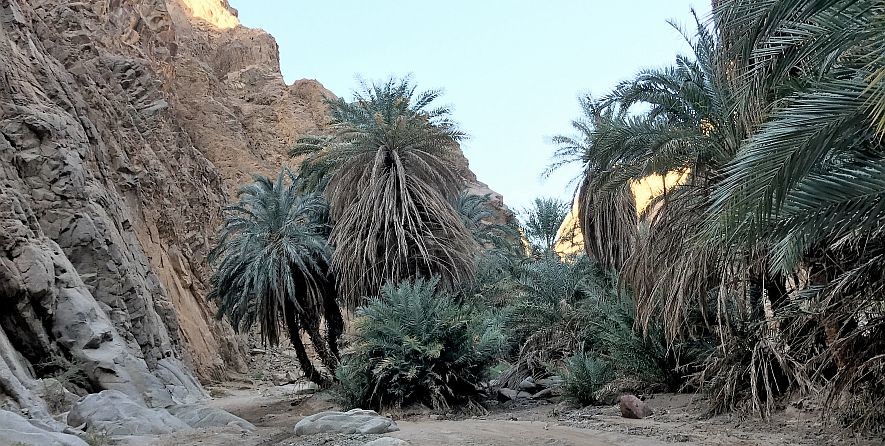
Departing from Elim, the Israelites entered the wilderness of Sin on the fifteenth day of the second month. The whole Israelite community grumbled against Moses and Aaron about a lack of food.
The Almighty told Moses that He would bring bread down from the sky, and they would gather each day’s portion as a test. On the sixth day, they would gather a double portion.
Moses and Aaron spoke to the Israelites, relaying the words of the Most High. Moses further noted that their inappropriate grumblings were against the Almighty Himself, and not him or Aaron.
Moses instructed Aaron to tell the Israelite community to advance forward and face the wilderness, and the Presence of the Most High appeared in the cloud.
The Eternal One told Moses to inform the people that He had heard their grumbling. They would eat meat in the evening and bread in the morning, and know that He is the Almighty.
In the evening quail appeared and covered the camp. In the morning a flaky substance lay on the ground. When the Israelites saw it, they said “What is it? (Hebrew ‘Mahn hu?’)” Moses told them that this was the bread given to them by the Almighty. The Israelites called it “manna.” They were to gather an omer* (measurement) per person; he who gathered much had no excess, and he who gathered little had no lack. Moses told them not to keep any of it through the next day. But they disregarded Moses. Some saved it, and the next day it became infested with maggots and stank. And Moses was very angry.
On the sixth day they gathered double the amount of manna. Moses explained that the next day would be a day of rest, a holy sabbath of the Almighty. They were told to save some for the following day, and it did not rot. Moses told them to eat that; they would not find the manna outside, since it was the sabbath. Nevertheless, some of the people tried to gather it, but found nothing, and the Most High complained to Moses that the people were refusing to obey His commandments.
Moses related to Aaron that the Eternal One commanded that a jar containing an omer of manna should be placed before the Almighty and kept throughout the ages (and placed before the Ark of the Covenant later).
The Israelites continued by stages as the Almighty would direct. They encamped at Rephidim, and had no water to drink. The people quarreled with Moses, demanding water. They complained that Moses had brought them out from Egypt to die from thirst. Moses cried out to the Eternal One, saying that the people would soon be stoning him. The Most High told Moses to pass by with some of the elders of Israel and strike the rock at Horeb, and drinking water would issue forth. The place was called Maasah and Meribah (“trial” and “quarrel”), because the people bickered against the Almighty.
Amalek came and fought against Israel at Rephidim. Moses sent Joshua to rally some men and wage battle against them. Moses, Aaron, and Hur went up to the top of the hill and Moses held out his hand. When his hand was raised, Israel prevailed; when it was lowered, Amalek prevailed. Aaron and Hur placed a stone under Moses and held up his hands, one on each side, until sunset. And so Joshua was victorious.
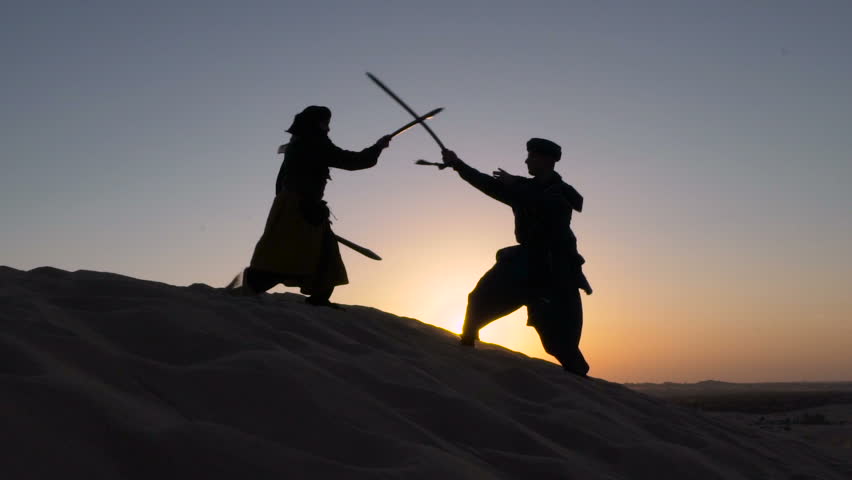
The Most High instructed Moses to inscribe in a document that He would utterly blot out the memory of Amalek from under Heaven. Moses built an altar, saying, “The Almighty will be at war with Amalek from generation to generation.”
Several questions have arisen from the Torah parasha, or portion, of Beshalach, relating to the terminology used by Moses in his song of praise. One specific question examines the phrase, “Mi k’mokha b’elim, Hashem? Who is like You among the ‘gods’?” Is ‘gods’ a correct translation of the Hebrew word elim? If not, then would a translation like “heavenly beings” (like angels) be better? Or perhaps elim should be rendered as elem, having more of a connotation of “mightiness”? If “gods” is a correct translation, then is Moses alluding to an endorsement of polytheistic beliefs (has v’halilah)? In other words, is Moses merely saying that the Almighty is the greatest of all deities, thereby implying that there are lesser ‘gods’ in existence?
Some have suggested that the probable answer lies in the content of the song and the events leading up to it. Exodus / Shemot 12:12 records the Most High as declaring, “I will dispense punishments against all the ‘gods’ of Egypt.” In this context, the Eternal One was emphasizing that the Ten Plagues were intended to destroy the Egyptians’ belief in their false deities. For instance, by bringing darkness upon Egypt, then the sun ‘god,’ Ra, was “punished and destroyed” by the Most High. It was impossible for the Egyptians to believe that Ra was a mighty ‘god.’ In fact, it became senseless to believe that — in light of the power of the Almighty as the monotheistic Creator — any of the Egyptian deities existed at all.
It should be noted that Pharaoh himself was declared to be a ‘god’ by the Egyptian pagan system, and the Midrash confirms that he was also a firstborn. But he didn’t die in the plague of the killing of the firstborn. The Midrash indicates that by surviving the tenth plague, Pharaoh thought that he was a ‘god’ greater than the Most High (has v’halilah). Thus, by allowing him to survive the killing of the firstborn, the Almighty stiffened Pharaoh’s heart one more time. And with that stiffened heart Pharaoh, his courtiers, and his charioteers waged a final battle against the Almighty in the Sea of Reeds, and they were utterly destroyed in a moment.
In that sense, perhaps Moses’ controversial statement is merely a declaration that the Almighty’s stated purpose of destroying the entire Egyptian belief system had come to a full, successful completion. The Most High said He would “punish” all of the so-called ‘gods’ of Egypt in Exodus / Shemot 12:12. He also said “all the Egyptians shall know that I am the L-RD [when I destroy Pharaoh and his chariots in the Sea of Reeds]” (e.g. Exodus / Shemot 14:4, 18:8). Now that the Eternal One had destroyed any ability to believe in the power of any false deity of Egypt, especially the ‘man-god’ of Pharaoh, Moses effectively declared, “Who among these so-called ‘gods,’ these phony ‘deities,’ of Egypt and any other nation, can compare to You? You are holy, awesome, and mighty; unlike these false ‘gods,’ because they don’t even exist.” As some have suggested, perhaps that is the deepest intent behind Moses’ classic utterance, “Mi k’mokha b’elim, Hashem? Who is like you among the ‘gods’?”
Another interesting thought that some have presented relates to the horses of the Egyptian chariots. All of the livestock, including the horses, of Egypt had been killed in a previous plague (Exodus / Shemot 9:6). These horses were used in pagan practices and idolatrous worship. However, they all died in a plague of pestilence from the Almighty; but the Israelite livestock did not die. Thus, by implication, these new horses were either Israelite in origin or purchased from other nations. Either way, they were not associated with the idolatry and paganism of Egypt.
In that context, it is interesting that the text of the Torah barely refers to the horses at all during the destruction at the Sea of Reeds, and only uses a singular phrase when it does. The term “sus Paroah,” or “the horse of Pharaoh” is used several times, but this is a singular term; “susei Paraoh” would be the proper plural. Similarly, in Exodus / Shemot 14:26, 28, 30, etc., only the charioteers and horsemen are mentioned; no horses are mentioned in the description of the final destruction at the Sea of Reeds.
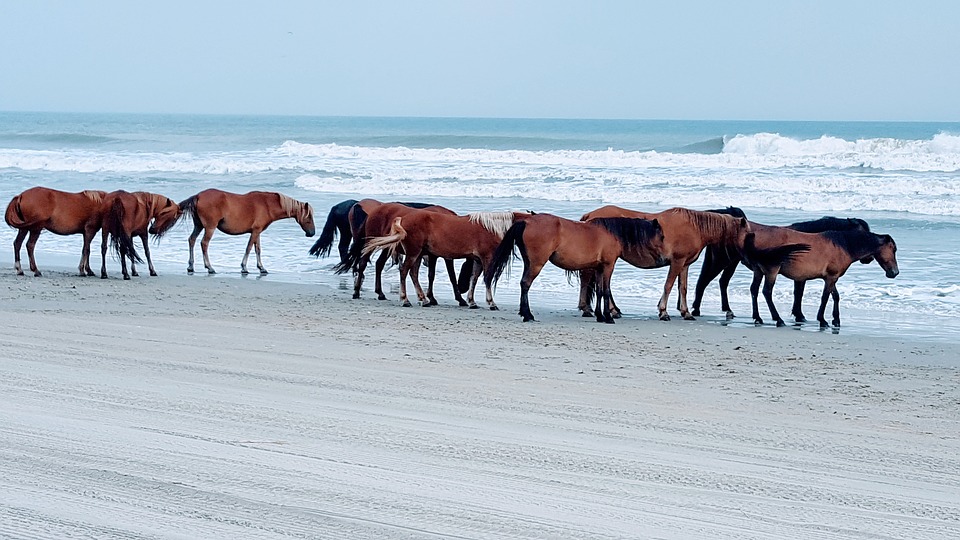
The premise that some have suggested is that the Almighty, being compassionate towards all of His creation, did not find it necessary to destroy the horses. Previously, since the Egyptians utilized their horses in connection with their pagan worship, the Most High killed them in a plague to show the Egyptians that the horses were neither “divine” nor “blessed by the ‘gods,’” etc. However, with these new horses, the Almighty may have spared them, since their destruction was unnecessary. The text tells us that the wheels of the chariots locked up, or they were broken. It is possible that the horses, if only out of a natural instinct for the pending shift of incoming sea water, panicked. Thrashing fearfully, they broke free of the Egyptian chariots and horsemen; or the Egyptians released them. Either way, they fled back to the shore before the walls of seawater crashed down and destroyed the Egyptians. Only Pharaoh’s own horse that he was riding (i.e. “sus Paraoh,” “the horse of Pharaoh”; “sus v’rokhevo,” “horse and his rider), was killed among the horses. Similarly, the Midrash indicates that the phrase “horse and his rider” in the song of Moses is a direct reference to Pharaoh himself.
This idea is just a theory based on the grammatical nuances and other details of the Torah’s account of the Sea of Reeds. But it does parallel other Tanakh passages, such as Jonah 4:11. In that passage, the Almighty is explaining to Jonah the prophet that He is compassionate for all of His creation, including even the animals and livestock of Nineveh. Thus, regardless of the validity of this theory regarding the possible exemption of the majority of the new Egyptian horses from the destruction at the Sea of Reeds, the premise still stands that the Almighty loves and cares about all of His creation, including even the animals.
Perhaps the greatest lesson of the account of the deliverance of the Israelites at the Sea of Reeds is the statement made by the Almighty when Moses and the people cried out to him as the Egyptians approached. Early Midrashic tradition tells us that when the Israelites saw the incoming Egyptian chariots, they had several responses. Some suggested committing suicide in the sea; some declared that they should surrender and return to slavery; some insisted that they should take a stand and fight; some sought to appeal to the nearby nations for compassionate support. Moses himself cried out to the Most High in fervent prayer.
But the Most High responded in a completely unexpected manner. He effectively said, “None of those approaches are what I wish you to do in this instance. You and the Israelites are commanded to move forward!”
In many situations in life it may seem like we are in an impossible conundrum. We feel that we know what the Almighty (and his Torah) require from us, but we don’t know what to do. There is a challenge to overcome, or a great “enemy,” (figurative or literal) that threatens to harm or even destroy us. But in those situations the Most High tells us to trust Him and move forward, even if that means that we have no option but to expect the sea to split before us and step into it.
May the Holy One, Blessed be He, continue to show us all His might and splendor, incessantly reiterating that there is no other “deity” besides Himself as our Almighty Creator. And may the Holy One, Blessed be He, give us the strength to move forward past every challenge and “enemy” in life, even if He has to split a sea (perhaps literally) to enable us to do so.

